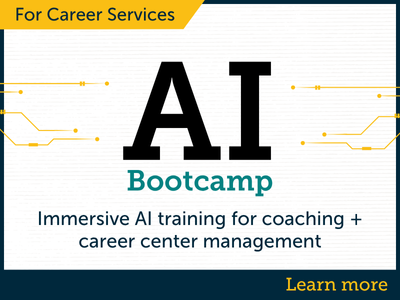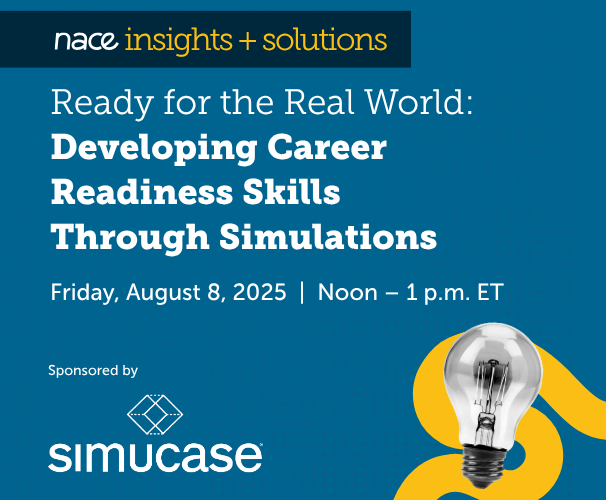NACE Journal, February 2021
Finding a professional mentor is widely suggested as a success strategy, whether one is early in their career, taking next steps and preparing for new challenges, or looking for external coaching on the types of high-impact issues leaders and managers may face.
Mentorship can be formalized through a professional association, workplace structure, or other program that makes matches and provides structure. It can also be informal, generated through one’s own networking and relationship building, with either regular or infrequent outreach and discussions. Mentors may serve as life-long advisers and confidants, but they can also be individuals who function as sponsors and champions of one’s success during a specific season—both types have value and can be meaningful to all parties involved.
For some, the idea of finding a mentor and/or being a mentor can be intimidating; this can keep individuals from establishing or participating in these types of relationships or programs. However, with an intentional focus on communication, accountability, strategy, and mutual benefit, mentorship can fuel career progress and satisfaction for both mentees and their mentors.
Value of Mentoring Relationships: Shared and Differing Identities
Marginalized groups often benefit professionally when they have a mentor that shares elements of their identities. Having a mentor who shares similar identities has been shown to lower instances of imposter syndrome. Many institutions have started to implement affinity group-sponsored mentorship programs because they believe that a form of professional development is building an inclusive and supportive environment.
NACE Mentor Program
NACE members can share their expertise as mentors or gain insight and knowledge as mentees through the NACE Mentor Program.Within marginalized groups, many individuals do not have the luxury of finding and connecting with mentors who share their identities. This does not mean that mentorship isn’t possible, or that great connections can’t be established to help individuals refine and move toward their goals. In fact, taking on a mentor or mentee with a different background or life experience can provide fresh perspective and even healthy challenge, allowing for growth and more holistic support.
With backgrounds that are distinct, it can be easier for a mentor not to impose their own pathway as the best fit for another, thus better supporting their mentee in developing unique goals and approaches to problem solving. Sometimes, establishing a mentoring relationship with someone with a different background or experience comes out of necessity, but it can also be a conscious choice and a value-add in one’s professional life.
[Editor’s note: See “Personal Insights From the Authors” for the authors’ personal experiences.]
What to Look for in a Mentor
When intentionally seeking out mentors who we may not automatically be drawn to based on shared identity, there are a number of indicators that someone may be a match for one’s own needs and style that are not always obvious on the surface. For example, things to look for include:
Shared values: In advance of writing this article and as we continued to grow our mentoring relationship, we completed a version of a card sort, based on Brown’s value-based career theory, and compared results. Out of a large list, we each selected our top 20 work values. Of these, we had nine core work values in common (45%), including belonging, compassion, cooperation, friendship, gratitude, growth, leadership, openness, and purpose. While we had sensed value alignment in a few spheres from our previous conversations, it was nice to see that validated in assessment form. Engaging in a conversation about work values with someone, observing how one’s actions and choices may demonstrate or allude to their values, and/or following up as part of a values sort or other team activity can be a great way to start a mentorship connection.
Shared hobbies and interests: Individuals may end up finding a professional mentor through engaging in similar activities, or discovering common interests in or out of the workplace. Everything from committee work to an office kickball team to discussing favorite podcasts and television shows can be ways to find colleagues one may want to get to know better and feel a true connection with. Why not take that shared interest and consider how that connection point could be expanded upon to have authentic conversations on work and life?
Similar personality type and preferences: One of us is an ESFP on the Myers-Briggs Type Indicator (MBTI) assessment and the other is an ENFJ. This means we both get our energy from connecting with other people (extrovert preference) and our decision-making is informed by potential impact on other people (feeling preference). Sharing these preferences allowed us to generate a quick and strong bond upon first meeting, and hold each other accountable, checking in often and building the relationship through conversation. Finding a mentor who shares elements of one’s personality type can make for a natural, positive connection opportunity that is easy to sustain because each party can empathize with core aspects of the other person’s way of being in the world.
Someone in a role you aspire to: This may mean seeking out a mentor in a supervisory or leadership position, or in an industry or organization one aspires to break into. This type of connection can be very practical and tangible in nature, supporting SMART goal setting, aligned with the individual goals of the mentor/mentee. One key aspect is accountability. Kim Scott’s book Radical Candor explains the concept of different professionals being at different stages of their development, and either being a “rock star” or “superstar.”1 A superstar is someone who is actively, intentionally moving upward on their career trajectory, seeking out new opportunities to grow and shine. A rock star is someone who is content at their level professionally and wants to commit to being excellent at their current position; this may mean turning down advancement opportunities or job offers while prioritizing stability. Superstars, in particular, may benefit from connecting with professionals in roles that reflect their next or future career aspirations, to provide coaching and context. Rock stars may benefit most from connecting with professionals who have been stable and successful in one role or at one organization/institution for a long time, asking for insight into long-term job satisfaction and impact. One can shift between rock star and superstar at different points in their career, and thus may seek out different mentors based on new or established values and interests.
Someone in a similar role at another institution/office: Mentors don’t always have to be more advanced in their career; peer-to-peer mentoring can be just as impactful and also inspire long-lasting connections. Engaging in a meaningful way with someone who holds the same type of role but works elsewhere can allow for empathy, benchmarking, brainstorming, and championing each other’s efforts, while allowing for more unbiased support and insight, compared to colleagues in one’s own office or organization. As you grow in your careers, you may be able to serve as references or confidential application reviewers for one another, as well.
Someone who seems like they would challenge you to think or act in new ways: Though you may connect most quickly with someone who shares your values or style, seeking out a mentor who can help expand your horizons, challenge your assumptions, and get you out of your comfort zone can be a game-changer in your professional development. If you observe a leader or colleague who complements your approach or experience, you may want to reach out and see how you can learn from them. This may mean finding a planner when you are more spontaneous, or an extrovert who loves public speaking when you tend to be more introverted and effective one-on-one. Consider how you’d like to grow and who may push you to get there in unexpected ways.
How to Start Strong in a New Mentoring Relationship
Mentorship relationships, whether established through a structured program or suggested by an individual, benefit from clarity of expectations on both sides. Though both parties may well be entering into the mentorship dynamic willingly, it can be most fruitful for the mentee to be the one to both kick things off and keep them moving forward. Doing this successfully may include:
- Making the initial outreach to your mentor (via email or otherwise), ideally right after matching or as soon as you decide you’d like to set up an initial conversation.
- Setting some structure for the relationship, including initial frequency and methods of meeting, e.g., weekly, monthly, quarterly; phone, virtual meeting, in person. This can always change, but it’s nice to have a starting point.
- Scheduling individual discussions, which may include sending out potential dates and times for the mentor to select from and sending out a calendar invitation once decided.
- Sharing meeting agenda items in advance, including current priorities and questions.
- Summarizing key takeaways and next steps at the end of each discussion.
- Following up on action items or critical updates, as appropriate, e.g., letting your mentor know how you liked a book/article they suggested or updating them on the status of your job search and interview process.
- Keeping the relationship going or making adjustments to expectations over time, especially if not part of a structured, time-limited mentorship program.
While these actions certainly take extra work and planning ahead on the side of the mentee, they also help ensure that the mentee gets what they most want out of both the overall mentoring relationship and each discussion. Having the mentee undertake these tasks also takes the pressure off of the mentor to figure out what the mentee really needs and how to add value to the relationship. It may be useful for mentees to create calendar reminders for some of the tasks above, to stay organized and timely, especially if the mentee is working with a few different mentors.
Meaningful Mentoring Relationships
Mentorship can be of immense benefit along one’s professional pathway, opening doors to new perspectives and opportunities, and helping individuals develop a sense of belonging, confidence, and purpose. While the benefits of finding a mentor who shares one’s identity or reflects a similar life experience may be numerous and expected, intentionally developing mentoring relationships with individuals who come from a diverse set of backgrounds also has great potential value to all involved participants.
Seeking out best-fit mentors for the short- or long term, and setting up those relationships for success, takes intention and persistence. It is important to look deeper than the surface level, and to consider how honesty, authenticity, and a proactive approach can make a difference in the depth of connection and how well it can support one’s goals and professional pursuits. Removing assumptions and inserting purposeful questions and structures can serve as a recipe for successful and meaningful mentorship across identities and differences.
Related Resources
Alpha Phi Alpha (2020, May 18). Rooted in research (webinar). Retrieved from https://youtu.be/S7jgl08CAPY.
Brown, Nadia E., and Montoya, Celeste (2020, October 16). Intersectional mentorship: A model for empowerment and transformation. Retrieved from www.cambridge.org/core/journals/ps-political-science-and-politics/article/intersectional-mentorship-a-model-for-empowerment-and-transformation/6973ED51EF068A3B28C6CEFDF0048833.
Civic Enterprises in association with Hart Research Associates Mary Bruce and John Bridgeland (2014, January) The mentoring effect: Young people’s perspectives on the outcomes and availability of mentoring. Retrieved from https://files.eric.ed.gov/fulltext/ED558065.pdf.
Cruz, Carmen (2020, September 18). A supervisor’s search for meaning: Lessons learned from a relational multicultural approach to mentorship. The Counseling Psychologist, 48(8). Retrieved from https://journals.sagepub.com/doi/abs/10.1177/0011000020958017?journalCode=tcpa.
Gut, D. M., Vanderveer, B.J., Trube, T.R., and Beam, P.C. (2020, September). Creating and sustaining a collaborative mentorship team: A handbook for practice and research. Charlotte, N.C.: Information Age Publishing.
Schielder, R. (2020, September). Richard Guy and mentorship. Retrieved from https://notes.math.ca/en/article/richard-guy-and-mentorship/.
Scott, Kim (2017). Radical candor: Be a kick-ass boss without losing your humanity. New York: St. Martin’s Publishing.
Willis, Gabe, (2020, October 29). I would not hire you: A mentorship story. Retrieved from www.linkedin.com/pulse/i-would-hire-you-mentorship-story-gabe-willis-ph-d/?trackingId=vGCxqWY3TfeJpqolp4LfMw%3D%3D.
Endnotes
1 Scott, Kim (2017). Radical Candor. St. Martin’s Press.







